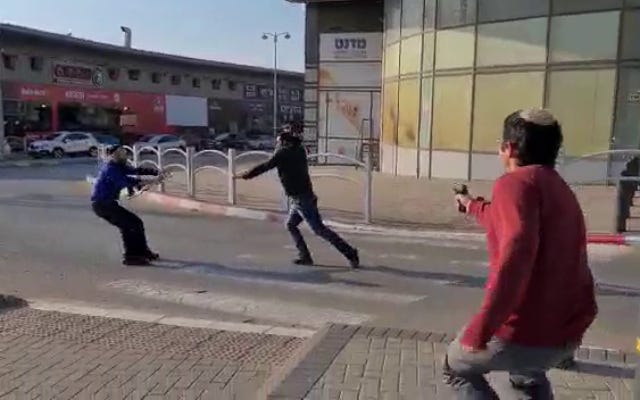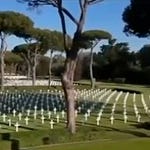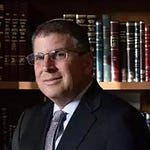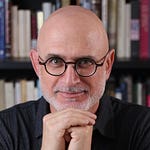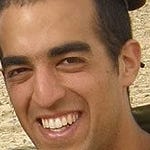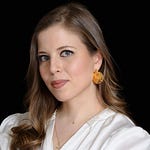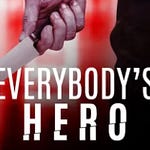This cover from the magazine section of Makor Rishon, an Israeli newspaper, captured a long-brewing sentiment. The headline reads “The Enemy Within.”
The smaller headline, in black, reads: “The murderous rampage in Be’er Sheva, which ended in the deaths of four Israelis, heightens the sense of insecurity and lawlessness felt by residents of the Negev. In order to deal with terror on the part of those who have Israeli citizenship, the security forces need to start learning some lessons.”
PLEASE NOTE: THIS POST WAS PREPARED PRIOR TO NEWS OF THE MOST RECENT TERROR ATTACK IN HADERA LAST NIGHT, IN WHICH AT LEAST TWO MORE JEWS WERE KILLED, ONCE AGAIN BY ISRAELI ARABS INFLUENCED BY ISLAMIC STATE. THE TREND IS DANGEROUS AND ALARMING, AND WE WILL COVER IT IN FUTURE POSTINGS.
When the Chief of Israel’s Police visited the scene of last week’s terror attack, he was almost assaulted by the crowd of Israelis who had gathered. Usually, when the security forces show up after a terror incident, they are welcomed, seen as helping to protect Israelis, even when the most awful occurs.
But not this time. Residents of the Negev (and parts of the Galilee) have felt, for years, that the government has abandoned them to the violence and crime of the Bedouin community. According to some estimates, some 100,000 acres of Israeli land have been ceded to the Bedouin—security forces will not or cannot exercise control in those areas, and the Bedouin have, some say, created a state within a state. Had two armed Israelis not been present and shot the assailant (see the photo below), more people might have died.
The police, increasing numbers of Israelis are saying, are understaffed, poorly trained and often inept. Israel defends its borders admirably, but inside the country, it’s too often the “wild, wild Negev.” You may recall our earlier podcasts with Tahel Harris (a Jewish resident of Lod) and Iyman Ansari (a Moslem resident of East Jerusalem), both of whom spoke about the utter ineffectiveness of the police in protecting them during the riots of May 2021. (Those podcasts are now accessible for everyone to hear.)
To learn more about this issue, we turned to Yoel Zilberman, CEO and Founder of HaShomer HaChadash, an organization designed to protect farmers and others who cannot defend their own lands, and which also runs numerous educational programs for young Israelis to inculcate in them a love of the Land of Israel and a devotion to protecting it in the tradition of the “original” Shomer—the first armed force of the Jews in Palestine more than a century ago. See their logo of the person on the horse—they are evoking their ancestors, without whom this country would not have come to be.
What Yoel has to say is deeply troubling—but since Israel from the Inside is designed to cast light on all dimensions of Israeli society, we felt it was important to air this issue, now rekindled because of last week’s murders.
We are presenting our conversation with Yoel as a podcast, which you can listen to through the player above. A heavily abridged transcript is also provided for those who prefer to read.
This week, given the horrible events that took place, I turned to an old friend and someone whose work I respect, Yoel Zilberman, who is the CEO and founder of an organization called HaShomer HaHadash, the New Shomer or the New Guard. We'll find out from Yoel what the old shomer was, what the old “Guard” organization was. It goes way back in Zionist history. So, we’re going to learn a lot from Yoel about not only his organization, but more importantly, what’s going on in Israel and what’s going on in the agricultural world. So, first of all, Yoel, thank you very much for taking the time on short notice to be with us in this conversation.
Thank you. Happy to be here. Thank you.
So, Yoel, tell us a little bit about yourself quickly, your background, where you studied, what you did in the army and all of that. And then we'll get to the specific incident in your family that led you to be involved in the kind of work that you're involved in.
So, I'll say in brief that today I’m the CEO of organization that is called HaShomer HaHadash. We are running operations with more than 100,000 volunteers, helping farmers all over Israel. Most of the farmers have a lack of manpower and they face very hard attacks of what we call agriculture terrorism. Farmers have experienced people burning their fields and trying to take over their lands, it’s something that is happening in Israel in the last 20 years, most of them in the northern part of Israel, in the Galilee or in the south in the Negev. So, that is why the organization started.
But we put our focus very much in the last five- six years, mostly on education. So, today we have also a very big youth movement with more than 24,000 participants and four boarding schools in different locations all over Israel and an option to do a gap year inside the organization, post army programs and many partnerships together with the government, mostly centered on creating the future people that will take care of the food security of Israel and from the other side, protecting the land, which is something that is centered in our identity.
So, this is what we are doing mainly in the organization. I'll say that we have a very strong and big operation with more than 3,000 people volunteering, often in four different units. One unit is together with the Israeli border police called Magav. The second one is a jeep unit. We have a motorbike unit and a drone unit. Volunteers come in around every two weeks to three weeks. Usually, it will be overnight and they will help the farmers. The volunteers allow the farmer to go home to his family for the night because he cannot work 24 hours a day. The volunteers will do the night patrol and we’ll take care of his fields. And again, we have many partnerships together with the police, hand to hand with the police, we help them to do many operations. We understand that the police in Israel is a very small organization. That their ability to take care of the challenges in Israel, especially when they have accidents like in Jerusalem or Judea and Samaria, etc., this will be their focus, and they need to take care of people’s lives and keeping people safe. It's clear why, but then the fields in the Negev and the Galilee are at a very big risk. And unfortunately, we know that there is about at least 100,000 acres of land all over the Negev that are abandoned. Land abandoned by farmers and actually also the army, the IDF also lost land, as well as the National Park authority.
My personal story is that in 2006, I was in my service in the army. I served in the Israeli Navy Seals and during the Second Lebanon War. In 2006, close friends of mine were killed in the war. And it's something that was an earthquake in my life. A few months after that, my father, who works with cows and sheep (I grew up as a shepherd) found himself in front of a Mafia family, eleven men that told my father very clearly that they are going to take over his field and he should leave that field.
It was in the lower Galilee. It was a Bedouin family, a Muslim family from a village nearby. And I’ll say that we have a lot of close friends from this village. But this specific family took the decision that they are going to take over my father’s fields. We’re speaking about 1500 acres of land. It’s a lot of land. And they started to burn the fields. They start to cut his fences; they started to kill his cows. And in the end, three men from the family attacked my father and after that he was mentally broken.
My brother and I, we were both in the army and were only coming home maybe every week or two weeks, and he was all alone. So, we were sitting together with the police officer of the region and he told my father, “Listen, I’m dealing with murderers, robbers and all sorts of things. I apologize, but my best advice for you will be to give them some piece of land or protection money to pay them monthly and hopefully they will leave you alone.” Later on Friday night, we were sitting around the Friday night Shabbat table, and he was literally telling the family that he’s going to sell the business.
He said he couldn’t take it anymore and that it would be better to have a shoe store in the mall than fight for his land. He said, “every day I’m a farmer for maybe two hours a day, and then for 10 hours I’m just fighting to keep my land.” So right after I heard that, I told my father, “Listen, over my dead body will you sell the land.” And I went back to my unit in the army, I got some big Israeli flag from my officer. Then the next Friday when I came back home, I planted a long stick with this flag. I built a small tent. I brought my books from the mechina academy that I did before the army, and I moved to live on the land. I lived there for two and a half years. And this is the way it started. It became a place where many people, most of the farmers or kids of farmers came to me and shared the same story.
Then we held a very big event with many farmers that came from all over Israel, and I was shocked to understand that it’s not my father’s story—it’s a national story. The national story is again that we don’t have any basic security for our farmers. Second, we don’t have a second generation that will take on agriculture because farmers tell their kids, “Do everything you can, but don’t be farmers.” From the research that we did, and are doing, we see that more than 70% of the farmers, the reason why they tell this to their kids is because the agriculture crime. They said farmers are all alone and not supported by anyone.
And thirdly, we understood that agriculture was always, always since the establishment of Israel and before the establishment of Israel, one of our number one sources of pride, we saw agriculture as something that brings us back to the land, back to our nation, connects between us. People were coming to volunteer in the kibbutzim 30-40 years ago. And I think that these three parts made us establish this movement called the Shomer.
Now I'll jump forward. I will say that in 2020, at the end of 2020, we saw a huge increase in the attacks on the farmers and the way the other side behaved. It was something that we never saw before—the use of guns, the courage to get inside IDF lands and to establish thousands of grass greenhouses. Today we have 5,000 illegal greenhouses inside IDF land in the Negev.
There is an argument between the army and the police. The army says, “listen, my responsibility is to take care of our borders and if something is happening inside our state, even though this land is in my authority, it’s your responsibility to take care of crimes that happen inside the land.” So this argument has been happening throughout many years and we’ve also seen that all the terror attacks inside villages, when criminals kill other criminals, their cars, their guns, all of their operations is in the open field.
At the end of 2020, there was a very sad rape where three Bedouins got inside a Jewish village nearby the border with Egypt and they raped a ten-year-old girl. And when they came and did that, we understood that things have changed. We are living in a new world. The way [these criminals] saw how much they control and will not get punished and nobody will deal with them, go to a new level. So, we went to the minister of the police that time, it was the beginning of 2021 and we told them, “Listen, if you are not going to increase the police force right now with at least another 4,000 people, you will find yourself in a huge explosion that is just on the corner.”
And we told them, “Listen, if you cannot pay for new policemen, at least take the Israeli model of the reserves that for every one soldier that is in the service, you have another four people in the reserve that do every year 15 days or 18 days or 20 days of volunteering and coming to the IDF as a reserve soldier.”
And we told them that if they will increase the police now with 4,000 people, the impact will be immediate. And the minister listened to us, and he said, “I understand what you are saying, and I understand we are in a very bad situation, but the government works very, very slowly.”
So, we got together with one of the biggest newspapers in Israel, Israel Hayom, and we organized a very big conference on March 15th. We called this conference The Fight Against Crime in Israel, and it was the first time ever that there was this kind of conference in Israel. It was attended by 30 ministers, Knesset members, police, people from all the aspects of society. We spoke about the problem of the building companies in Israel today, which are speaking about paying between 600 to 700 million shekels in protection money to criminal companies inside Israel… all Arab organizations. We spoke about the loss of control in the Negev. You need to understand that in May when there was the battle against Gaza, the situation, the pogroms here in Israel, people didn’t speak about the many junctions and cities that were blocked in the Negev and that the Air Force didn’t allow its soldiers to drive to their bases if they were not driving with at least another seven or eight cars together. And sometimes the soldiers were flying in airplanes or helicopters from one base to another because they couldn’t do a 30-minute drive on the roads. There were toppled light poles and the roads were blocked. The main roads of the Negev were blocked. It was actually the same village where this guy is from, the guy who just murdered the four people this week in the terror attack, that was blocking the road between Beer Sheva and Arad in the eastern Negev.
What's in it for them? What are they trying to get out of knocking down the light poles on these brand-new highways and making it impossible to get by? What are they trying to accomplish?
In May, seven Arab mayors came to us and asked us to do an emergency partnership together with them. They said, “Listen, we are seven mayors of Bedouin villages in the Galilee. We served in the Israeli IDF, and we are the last mayors that will be people who serve in the IDF in the Bedouin, villages, cities.” They told us nobody is dealing with the education that our kids are getting… They watch Al Jazeera; their teachers are coming from Sachne or Arabe, towns that are very related to the Islamic movement. The values, the conversation in the classroom is not about a love of Israel, of the Jewish and democratic state. This is the situation. And the mayors said to us, “Listen, let’s build a new educational system. Let’s create places with people that already served in the Israeli IDF. Let's take care of them so they will get job opportunities. And the last and the most important part, let's build some system inside our villages that will give people a feeling of safety.”
And what happened? And let’s say the truth. We are the Israeli government. We are the Jews in Israel. We were afraid to take control and to organize the life of our neighbors, of our Arabs and Bedouin villages. And for 20-30 years, we have been afraid to stand there and to decide by ourselves how the standard is going to look like, how the rule will be, how we will take care of the rules will be and that the law will be enforced.
But here’s a country that fought off five standing armies in 1947 to 1949. It’s managed to survive attacks from the outside time and time again. And here is this guy, Yoel Zilberman, who’s telling us that there are how many acres would you see across Israel are now not in our control? What’s the number?
At least 100,000 acres.
100,000 acres of land in the Jewish state, which is not exactly an enormous state, to put it mildly, is simply kind of giving up control. And it's being run by either Bedouins or other Arab crime families or so forth. People are probably listening to this and scratching their heads and saying, well, how did this happen? I mean, nobody in the world thinks of Israel as a kind of a passive actor in the Middle East. If anything, it’s criticized for being quite the opposite. So how is it that Israel is criticized for being too aggressive on the outside and you’re telling us the story that some people are kind of grabbing it from the inside? What’s the policy of the government, is it only an issue of manpower? Is it a fear of something else? What’s going on here, really?
I think that it was very clear to everybody that keeping the borders from, like you said, five different armies, it’s a life-or-death issue. If we don't take care of it, we won't be here. So, we created one of the strongest armies in the world and you see how many companies in Israel were established because of the abilities that were growing here within the Israeli IDF.
Well, the whole tech sector is what you’re referring to. Israel’s whole technological revolution is in large measure fueled by people who were trained in a whole different array of ways in the IDF, right?
Exactly. And I think that if you look at what happened in Israel in the 50’s and the 60’s, the one that was controlling the situation was the army and then they stopped controlling these areas. And remember that when the police was established in 1948 it was based on the infrastructure of the British police, which was not so good. And it wasn’t the people who were much appreciated inside Israel.
So, if you look forward in 1974, there was a very bad attack on the kids’ school in Ma’alot, and Sayeret Matkal [Israel’s elite commando unit] was there, and they failed in the mission. But the interesting thing was that the Minister of Defense said that it was the fault of the Minister of the Police because they were not ready for it. So, they established the Israeli SWAT team, but still, the police were always very weak.
And then you see in the 1990’s, all the terror attacks in the 90’s, the police didn’t control the situation. Then you see it again in the beginning of the 2000, it was exactly the same. If you look from 2014, the amount of officers, the highest officers in the police, you will see that the majority of the high officers of the police left in 2014- 2015. You see that the infrastructure of this organization is very weak, okay? It’s not ready and it’s not capable to take on the challenges that face it. So, you started [this conversation with] the story about the chief of staff of the police [this week], that people came to him and were complaining instead of hugging him and strengthening him and his mission. People have a very clear feeling that they are right now abandoned by the police. They do not trust the police in Israel. And we see more and more in our research that when people steal the land of farmers, more than 30% of the farmers are not complaining to the police and are not calling the police because they don’t believe that the police will do anything. More than that, they think that it will waste a whole day of work if they go to the police.
The situation is that in Israel right now, there is a loss of trust in the police. And I think that there is in every state, there is a very clear, let’s say there is a contract between the state and the people. You pay taxes, and you know that you will be safe. They need to take care of your safety. You are not buying your own tank and you are not buying your own guns because you know that the government will take care of you. And I think that what people feel more and more is that the government is not dealing with this issue at all.
What’s going on in the Negev? Let’s say the truth. Every Bedouin husband has three or four wives. And then they have something like 20 to 40 kids. These wives are usually from villages, from the mountains of Hebron, or cities like Yatta. The kids are not getting a democratic kind of education, and of course not [an education] to love the Jews.
So, imagine that… ten years ago, there were 150,000 Bedouins in the Negev. Today you have 300,000. Not so far away from now, they are going to be the majority in the Negev. It’s very close.
And more and more of our leaders were thinking that if we don’t do anything things will be okay by themselves, because we have Tel Aviv, we have Jerusalem, we have a great high-tech industry, and we have great abilities. But they don’t understand that they live in a very small island in Tel Aviv, okay? And sometimes they need to get a passport to drive to the Negev or to the Galilee. It’s funny, it’s ridiculous, but this is the situation. They really are not aware of what is going on there. So, you don't see resources that go into these areas, no solutions, no strategy, and most of all, no courage to confront the situation and start to build solutions.
What are you actually doing to fight back?
I'll give you the answers in two completely different perspectives. And I'll start with the longest one. First of all, we're looking 100 years forward, and we know when we look 100 years back that there was a group of people like the Shomer. It was founded on April 12, 1909. And we were established on April 12, 2007, exactly 98 years after.
We have people like Aharon David Gordon. We have people like Katzenelson, like Ben Gurion that spoke all the time about the importance of creating deep roots in the land. It’s something that without that, we would find ourselves easily abandoning our values, abandoning our lands, and leaving the state of Israel. And we see it. We see it very easily now. They always said even if people will live in Chicago and Sydney, and London, the only thing that will unite us, will not be Facebook or some virtual kind of connections, it will be the land of Israel. People will be able to have some experience, some opportunities of connecting to the land. And through that, we will all fill the ownership, the responsibility to our state, to our land.
And I think the first part of what we are trying to do is to build an infrastructure that our kids, and grandchildren, in the beginning of the 22nd century when they will ask, “what is Zionism?” so we are creating right now the operation that will be the pipeline to the land. And I think that it’s dramatically important also to create the next farmers of Israel and to create Israeli food security, etc. The second thing that we are trying to do is to work hand in hand together with the Israeli government… and what we’re trying to do is to convince the Israeli government that this is the time, take our volunteers, make them a reserve of the police, of the border police. What we’re trying to do is to convince the government of Israel that we are under a huge risk and what we called Shomer Hahomot (Guardian of the Walls), the events that we saw in May 2021, I’m telling you, it’s 10% if what we might see in the next round.
Because today the amount of weapons that the Bedouins in the Negev have right now, we’re not speaking about Samaria, Nablus or Hebron, we’re speaking about the center of the Negev, they have more weapons than two divisions of the IDF right now in the middle of the Negev. They smuggle weapons and drugs of more than 4 billion shekels a year between the Negev and Egypt… I'm sure that it's a national risk for our kids, for the youth in Israel, because [the drugs] go straight to Tel Aviv, straight to these central areas. And again, in my perspective, we’re losing these kids because of it. It’s becoming so easy to get, becoming so cultural. You see people that are less connected to almost everything.
Moses told to the spies that when they will get to Israel, if they see people living with big borders and big walls, to remember that this is a sign of a very weak people. They don’t feel at home. But if they will see people living in tents all over, that’s a sign that they are feeling that they are at home, that this is their land, this is their state.
And this is what happened to us. We put up fences, we put up borders, we put in walls. We are afraid to live in our state and they are spread all over, taking the land, building whatever they want. Every year, 3,000 illegal houses, every year in the Negev. Nobody is really confronting the situation and I really hope that what we will see is a public support. I think that today a serious leader from the government that will take on this project to change the face of the security inside Israel will get full support from Israeli citizens, Arab and Jews. Also, the Arabs are in a huge threat inside their villages, inside their cities, because the police are afraid to go inside these areas. So, they fight in between families there. It’s become normal that in the night while you sit in your village, and you hear noises of M16s all the night. It's something natural. And people now saw that it will get to our homes and it’s getting to our homes. It is becoming a real risk.
Well, people saw, for example, in May 2021, exactly what it looks like when that phenomenon spreads from the Galilee or the Negev into cities like Yafo and Lod and so on and so forth. And [former] President Rivlin said that literally pogroms had come to Israel, that the Jewish people in their own land was actually now facing pogroms, which of course was exactly what had gotten us to leave Europe and come to here in the first place. You’re obviously in close touch with the police. You're in close touch with Magav, the border patrol. You’re in close touch with the army, you’re in close touch with political figures all the time. Is your sense that the attitude of the government is shifting, that there is an increasing awareness on the part of the government that something needs to be done? Do you have a sense that this coalition under Bennett and Lapid is likely to do more, or do you think we’re back where we were five years ago without much change?
I worry that right now it’s completely not the focus of the government. And I think that because they want to keep their coalition, and I think that it goes against their interests as a coalition, I think that right now we are far away from the solution.
And unfortunately, I think we didn’t do even 5%, since what we saw in May, to make things look different.
We saw now in Purim when Mordechai told Esther “If not you somebody else.” He was trying to tell her if it’s not her, someone else will save the Jewish people, but the price is the price of blood. And I'm very sad to say that the death of these four people should never have happened. And I’m sad that we are going to lose more blood because we are not doing enough, and we are afraid to do enough. And we don't understand that the fear that we have goes against us, it’s like a cancer. We are attacking ourselves because we’re not doing anything. And I’m not complaining about the Arabs, because this is the easy thing to do. I’m saying that it’s me—I’m the one who’s afraid to confront the situation. I’m the one afraid to take real actions, to take leadership and change the situation. And again, what our organization is trying to do is to do its best and to get to as much places as we can. But it’s a national issue, and it’s not something that a nonprofit organization can resolve.
When you want to get a very big ship into the port, you must have a very small one that will guide it. So, we see ourselves as a small boat that wants to take the big ship outside the port. But still, it’s dramatically challenging when people are thinking too much from a political perspective. Maybe someone that will be the champion the cause, that will lead, maybe he will lose from leading the situation. But it’s dramatically necessary for our national security and for our life here in Israel.
I'll just end our really fascinating conversation by saying that it's necessary for the fulfillment of what Zionism was supposed to do. The idea of Zionism was to take us out of a place where we lived in fear and to establish a place where we would not be under pressure to have to conform to the outside, where we would not have to be under pressure to keep looking over our shoulder to see who’s going to do what to us next. The whole idea was to be a nation like all other nations. And what you're describing, Yoel, is a world in which too much of the state of Israel is actually a place where a Jew can’t be caught walking around at night anymore. And we’re not talking about the way out in the middle of the desert. We’re talking in the middle of Beersheba. There are young Jews, men and women, who are afraid to be out at night. There are people in Jewish villages all around the Galilee and all around the Negev who actually hunker down at night because of the gunfire that you were talking about. And every now and then a stray bullet goes through a house and if you’re in the wrong place at the wrong time, it can be disaster.
So, we’ve actually allowed, as you’re pointing out, we’ve allowed that new reality to get planted here. And what you're doing through both your work in terms of getting young volunteers to try to help farmers and others protect their fields, but also to do educational projects to give people a sense of the history of what we're doing here and what we’re about, it’s really an extraordinary Zionist project.
Since many of our readers will be busy and otherwise occupied during the Passover holiday, during the weeks of April 18 and 25 we will not be posting regular columns and podcasts, though we will post something for Yom HaShoah, Holocaust Remembrance Day.
The regular schedule will resume on the week of May 2.
Later this week, we return to the issue of refugees and immigrants, with an interview with Alex Rif, one of the founders of the One Million Lobby, a lobby that represents the interests of the one million Israelis who are of Russian/Soviet extraction. In her conversation with us, Alex describes the challenges these Russian immigrants faced, and how she and her colleagues are working to make sure that new immigrants are welcome with much greater opportunity.
That podcast will post on Thursday, for paid subscribers to Israel from the Inside. You are invited to hear a brief excerpt of our conversation with Alex here.
Our twitter feed is here; feel free to join there, too.




